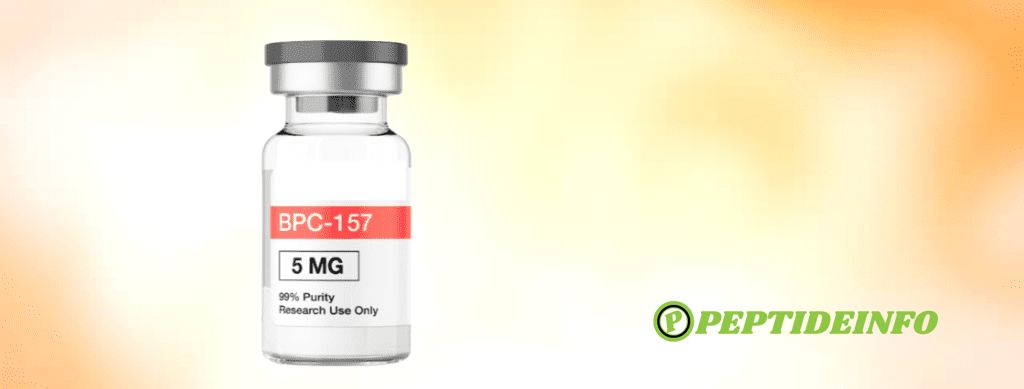What is TB-500?
TB-500 is a synthetically made iteration of thymosin beta-4, a naturally occurring peptide consisting of 43 amino acids. Found in nearly every type of human cell and tissue, thymosin beta-4 is highly concentrated in white blood cells and is known to contribute to the formation of blood cells, while accelerating processes of wound healing and tissue repair [1].
Early research found that thymosin beta-4 plays an important role in protecting injured cells and tissues from microbial growth and inflammation during the healing process. It works by upregulating actin, increasing angiogenesis, and mobilizing stem and progenitor cells, thus reducing myofibroblasts in wounds and the amount of scarring that occurs [1].
TB-500 has poor oral bioavailability and is thus administered via subcutaneous injection. However, there are also capsule-based formulas available that include Ac-SDKP, a TB-500 fragment with enhanced oral bioavailability compared to the full peptide sequence of thymosin beta-4.

Is TB-500 Legal?
When sold as a research chemical, TB-500 is available exclusively to licensed researchers and laboratory professionals. Reputable peptide vendors will list strongly worded disclaimers on their TB-500 product page, including that use of the peptide must be limited to scientific and educational research.
While researchers may legally purchase TB-500 as a reference material, it is nonetheless prudent to check local laws before placing an order.
Research Applications and Benefits of TB-500
While TB-500 is still classified as a research chemical, a number of studies and trials have explored its uses in test subjects [2]. Here is a summary of the top benefits of TB-500.
- Tissue repair: TB-500 can increase the rate at which new blood cells, blood vessels, and tissue fibers are formed, and help speed up the healing process while reducing scarring [1].
- Cardiovascular health: A 2016 study found that TB-500 improved left ventricular function in mice following myocardial infarction, with the authors concluding that the peptide may help mediate cardioprotection [3].
- Wound healing: A Phase I clinical trial published in 2005 found that TB-500 repairs injured tissues and plays a “key role” in dermal- and corneal-wound healing [4].
- Dry eye disorder treatment: In a clinical ocular trial, six patients with non-healing neurotrophic keratitis wounds reported a “significant reduction” in eye discomfort and “completely healed” after self-administering 0.1% Tβ4 eye drops 2 to 6 times per day for 28 days [5].
- Antioxidant and anti-inflammatory action: Shah et al. found that TB-500 prevented “oxidative stress, inflammation, and fibrosis” in mice with ethanol and LPS-induced liver injury and concluded it may be beneficial as a treatment of alcohol-related liver injury [6].
- Insulin resistance: A 2012 study found that TB-500 ameliorates hyperglycemia and improves insulin resistance in a mouse model of type 2 diabetes mellitus (T2DM), indicating that it may be an alternative insulin sensitizer [7].
- Hair growth: Animal studies have shown that TB-500 can increase the rate of hair growth in mice, while promoting cashmere production by increasing the number of secondary hair follicles in cashmere goats [8].
- Tumor suppression: Researchers found that mice injected with TB-500 over-expressing myeloma cells showed a longer survival compared to mice injected with controls, with the authors concluding that the peptide may have a “tumor suppressive function” [9].
- TB-500 and cancer research: Huang et al. noted that TB-500 may have a place in non-small cell lung cancer (NSCLC) therapy as it appears to suppress the proliferation of NSCLC cells by repressing Notch1 activation [10].
TB-500 Side Effects
Researchers are still in the process of determining what, if any, side effects may result from TB-500 administration.
As with the injection of any peptide, researchers should expect a low likelihood of injection-related side effects when administering TB-500. These may include pain, reddening, and/or discomfort at the injection site. Researchers are well-advised to rotate injection sites to mitigate the risk of injection-related reactions.
With reference to several small-scale, short-term studies involving TB-500, Goldstein et al. (2005) concluded that TB-500 has exhibited “no signs of toxicity at any given dose” and has been well-tolerated [5].
In three phase 2 clinical ocular trials during which patients self-administered 0.1% Tβ4 eye drops 2 to 6 times per day for 28 days reported “no evidence of any adverse events”. However, the researchers cautioned that “no long-term safety studies have been done with Tβ4 treatment in the eye for more than a month” [6].
Given the lack of long-term research involving TB-500, researchers’ ability to draw meaningful conclusions regarding TB-500’s long-term safety is limited, suggesting further investigation is required.
TB-500 Dosage Calculator
TB-500 is usually shipped in the form of freeze dried (lyophilized) powder that should be reconstituted with a solution like bacteriostatic water.
As most published TB-500 research to date has involved rodents, there is limited data from which to calculate TB-500 dosage in an experimental setting.
Researchers may refer to the following TB-500 dosing protocol in injury recovery contexts:
- Daily Dosage: 2mg TB-500, administered daily via subcutaneous injection
- Study Duration: 15 days.
- Notes: This protocol requires three TB-500 10mg vials per test subject per course. Depending on the subject’s recovery, researchers may continue to administer a lowered maintenance dosage of 1mg daily until full or near-full recovery.

Where to Buy TB-500 Online? | 2024 Edition
Researchers looking to delve into the benefits of TB-500 will find multiple vendors offering this peptide for sale online. But with so many to choose from, selecting a reliable, trustworthy vendor can be a challenge.
To help researchers decide where to order high-purity peptides, our team has made a series of test orders from several leading peptide vendors, ranking them according to their service, product quality, and shipping times.
Based on our review, we currently recommend two exceptional peptide vendors:
Research Peptide
Research Peptide does an incredible job of delivering high-quality peptides and we highly recommend them to any researcher for these reasons:
- Lab-Verified TB-500: Research Peptide submits each batch of TB-500 for quality and purity testing by an independent laboratory before listing it for sale. This ensures the vendor offers some of the highest quality TB-500 on the market.
- Rapid and Secure Checkout: The accessible website provides rapid and secure checkout. Client information is secured with SSL encryption, and many payment methods are accepted.
- Helpful Support and Service: Researchers with questions or concerns can call or email Research Peptide
friendly support staff, who strive to answer all inquiries as quickly as possible. - Great, Fast Shipping: Orders will ship out the same day or the next day and the vendor uses FedEx two-day shipping. Overnight same-day shipping options are also an option for researchers with Research Peptide.
- Shipping Insurance: Research Peptide is one of the few suppliers who offers affordable shipping insurance. This ensures all researchers can buy with confidence from them.
- Great Payment Options: Research Peptide does accept all major credit cards. On top of that, they also accept e-check, Cash App, and cryptocurrency. This gives researchers a variety of payment options.
One thing we love about this research peptides vendor is the unique TB-500 combos and formulations. Research Peptide offers lyophilized TB-500, but they also have:
- BPC-157 + TB-500 Nasal Spray
Researchers can click the button below and then use this code to get 10% off the next order:
peptideinfonet10
Buy TB-500 from our top-rated vendor…
Bacteriostatic Water and TB-500
Finding the full range of necessary items can be a headache for researchers, stalling their study and work. Required materials include alcohol swabs, bacteriostatic water, sterile vials, and more.
To boost the research community, Peptideinfo.net expert research team has located the best online source for materials required when handling research peptides.
TB-500 Benefits | Verdict
Researchers looking to explore the benefits of TB-500 will note that this research chemical presents many opportunities for further investigation. In particular, it holds promise in contexts of wound healing, tissue repair, cardiovascular health, and the treatment of inflammatory conditions.
As TB-500 appears to be well-tolerated by test subjects while offering a range of potentially beneficial biological effects, researchers interested in conducting long-term research have multiple avenues that they may wish to explore.


